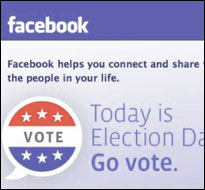A wide range of research has explored the dynamics of the Facebook ecosystem, from how messages spread within networks to the outsized impact of influential individuals. A key area of debate revolves around the role of “strong ties” and “weak ties” — the true depth of connection between individuals — in determining the behavior of networks and their power to influence the offline world.
A 2012 study published in the journal Nature, “A 61-Million-Person Experiment in Social Influence and Political Mobilization,” tested the idea that voting behavior can be significantly influenced by messages on Facebook. On Election Day 2010 — the Congressional midterms — 60,055,176 Facebook users were shown messages at the top of their news feeds that encouraged them to vote, pointed to nearby polling places, offered a place to click “I Voted” and displayed images of select friends who had already voted (the “social message”). Two smaller groups — each about 600,000 people — were given either voting-encouragement messages but no data about friends’ behavior (an “informational message”) or were not given any voting-related messages.
The researchers, from the University of California, San Diego, and Facebook, also were able to analyze the voting behavior of approximately 6.3 million subjects using publicly available records. For the study’s purposes, close friends were defined by the frequency of online interactions and were assumed to be more likely to have face-to-face interactions. The researchers involved were Robert M. Bond, Christopher J. Fariss, Jason J. Jones, Adam D. I. Kramer, Cameron Marlow, Jaime E. Settle and James H. Fowler, the corresponding author.
The study’s findings include:
- The data “suggest that the Facebook social message increased turnout directly by about 60,000 voters and indirectly through social contagion by another 280,000 voters, for a total of 340,000 additional votes.”
- Strong ties between friends proved much more influential than weak ties: “Close friends exerted about four times more influence on the total number of validated voters mobilized than the message itself…. Online mobilization works because it primarily spreads through strong-tie networks that probably exist offline but have an online representation.”
- “To put these results in context, it is important to note that turnout has been steadily increasing in recent U.S. midterm elections, from 36.3% of the voting-age population in 2002 to 37.2% in 2006, and to 37.8% in 2010.” The 340,000 additional votes attributed to Facebook messages represents “0.14% of the voting age population of about 236 million in 2010…. It is possible that more of the 0.60% growth in turnout between 2006 and 2010 might have been caused by a single message on Facebook.”
The researchers conclude the study has a number of implications: “First and foremost, online political mobilization works. It induces political self-expression, but it also induces information gathering and real, validated voter turnout. Although previous research suggested that online messages do not work, it is possible that conventional sample sizes may not be large enough to detect the modest effect sizes shown here. We also show that social mobilization in online networks is significantly more effective than informational mobilization alone. Showing familiar faces to users can dramatically improve the effectiveness of a mobilization message.”
Tags: Facebook


Expert Commentary